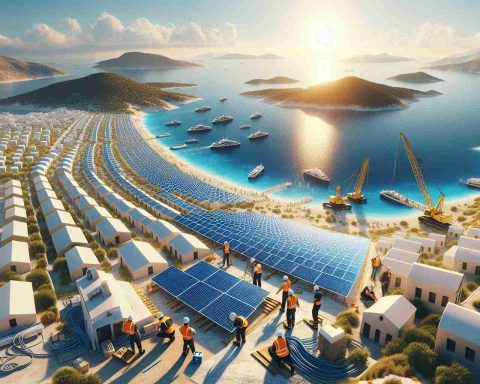Greece takes a giant leap towards sustainable energy solutions. A groundbreaking loan agreement has been established between the National Bank of Greece and ELSEWEDY ELECTRIC SAE to finance the nation’s inaugural energy storage initiative.
This state-of-the-art project, boasting an impressive capacity of 50MW/100MWh, emerged victorious from the first Competitive Procedure orchestrated by the Regulatory Authority for Waste, Energy, and Water in July 2023. The facility will be strategically located in Oinofyta, within the Tanagra Municipality of Boeotia in Central Greece, and will be directly linked to the high-voltage grid through an on-site medium-to-high voltage substation.
The total investment for this pioneering endeavor is €41.9 million, sourced through various channels: €5.5 million from the Recovery and Resilience Facility, €10 million in investment support, €18.2 million through bank financing from the National Bank of Greece, and €8.2 million contributed as equity by ELSEWEDY ELECTRIC SAE. Completion of the project is anticipated by the end of 2025.
The storage unit will engage in energy sales under a 10-year Operational Support Agreement with the Administrator of Renewable Energy Sources and Guarantees of Origin, further cementing Greece’s commitment to sustainability. This ambitious initiative aligns with the country’s National Recovery and Resilience Plan, Greece 2.0, and illustrates the vital role of international partnerships in advancing renewable energy and fostering environmental stewardship.
The Broader Implications of Greece’s Energy Storage Initiative
Greece’s newly established energy storage project marks a pivotal shift not only in the nation’s energy landscape but also within the wider context of global sustainable energy practices. As countries grapple with climate change and energy security, this initiative could set a precedent for integrating large-scale renewable energy solutions in economically sensitive regions.
This project is a formidable investment in the future of the European Union’s energy framework, positioning Greece as a leader within the bloc. With the EU aiming for a 55% reduction in greenhouse gas emissions by 2030, successful models like this may encourage similar investments across member states. Such advancements may spark an uptick in the adoption of renewable technologies, transform energy markets, and lead to an overarching decrease in reliance on fossil fuels.
On an environmental level, energy storage mitigates the challenges posed by the intermittent nature of renewable sources like wind and solar. By leveraging these technologies, Greece reduces the risk of blackouts, enhances grid stability, and promotes a more resilient power supply, fostering long-term sustainability.
Future trends suggest a surge in energy storage investments worldwide, projected to exceed $620 billion by 2030. Consequently, Greece’s initiative not only emphasizes local advancement but could catalyze a global movement towards innovative and sustainable energy practices, ultimately fostering healthier ecosystems and more resilient economies.
Greece’s Innovative Leap into Energy Storage: A Sustainable Future Awaits
Greece is setting a new benchmark in renewable energy with a pioneering energy storage initiative that promises to transform its energy landscape. This project, which has gained momentum through a strategic loan agreement between the National Bank of Greece and ELSEWEDY ELECTRIC SAE, marks a significant step toward achieving sustainability goals.
Key Features of the Energy Storage Initiative
The energy storage facility, with a remarkable capacity of 50MW/100MWh, will be situated in Oinofyta, Tanagra Municipality. This cutting-edge installation aims to enhance the stability and reliability of the high-voltage grid, showcasing Greece’s commitment to integrating renewable energy sources efficiently.
Capacity and Connectivity
– Capacity: 50MW/100MWh
– Location: Oinofyta, Central Greece
– Connectivity: Directly linked to the high-voltage grid
Financial Overview and Investment Structure
The financial backing for this project totals €41.9 million, demonstrating robust support from multiple sources:
– Recovery and Resilience Facility: €5.5 million
– Investment Support: €10 million
– National Bank of Greece Financing: €18.2 million
– Equity from ELSEWEDY ELECTRIC SAE: €8.2 million
This diverse funding model highlights international collaboration and investment in sustainable energy.
Operational Agreements and Long-Term Vision
Structured under a 10-year Operational Support Agreement with the Administrator of Renewable Energy Sources and Guarantees of Origin, this storage facility will not only sell energy but also help manage the decentralized energy mix that Greece is pursuing.
Alignment with National Strategies
The project is intricately aligned with the country’s National Recovery and Resilience Plan, known as Greece 2.0. This vision includes enhancing energy security, reducing greenhouse gas emissions, and accelerating the shift toward a more environmentally friendly energy system.
Pros and Cons of the Energy Storage Initiative
Pros:
– Boosts Energy Independence: Integrates renewable sources for improved energy security.
– Promotes Economic Growth: Attracts investments and creates jobs in the renewable sector.
– Environmental Benefits: Reduces reliance on fossil fuels and lowers carbon emissions.
Cons:
– High Initial Investment: Significant upfront costs may deter smaller entities.
– Project Timelines: Anticipated completion by the end of 2025 could delay full benefits.
– Technological Dependence: Reliance on advanced technology may pose risks if unforeseen challenges arise.
Future Trends and Innovations
As Greece embraces this energy storage project, it sets a precedent for other nations aiming to incorporate large-scale renewable energy solutions. The increasing focus on energy resiliency, sustainability, and technological innovation reflects a growing trend among global energy markets.
Conclusion
Greece’s new energy storage initiative represents a crucial leap toward a sustainable future. By prioritizing renewable energy investment and international collaboration, Greece not only addresses its current energy challenges but also paves the way for a greener tomorrow. For more insights on Greece’s initiatives and innovations in renewable energy, visit the Ministry’s official page.












